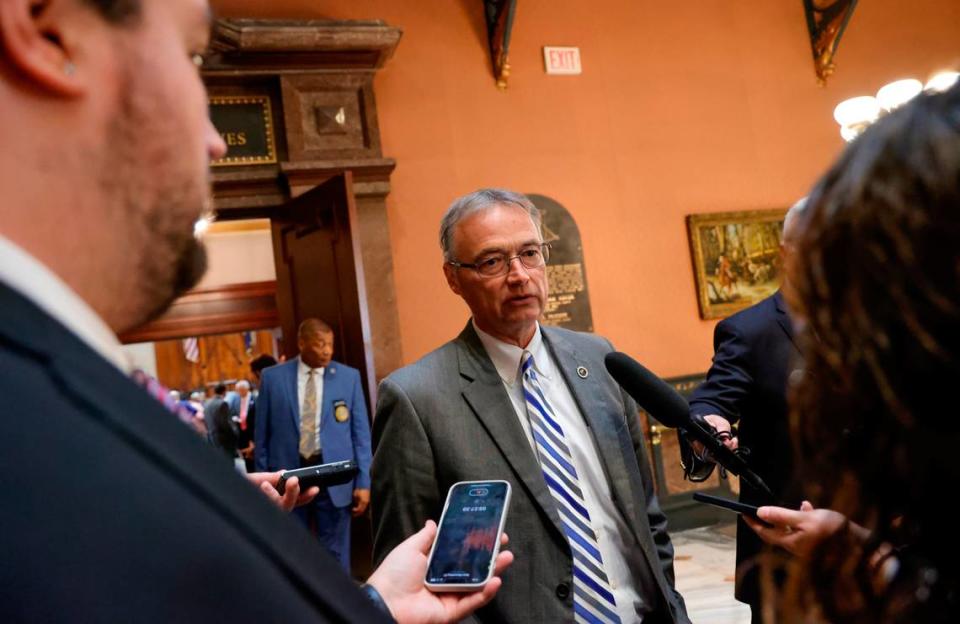More restrictive SC abortion ban likely dead after House rejects Senate changes
Efforts to pass more restrictive abortion legislation in the S.C. State House is likely doomed after the state House on Tuesday rejected a proposal that would ban abortions after about six weeks of pregnancy but would allow a narrow exception for abortions in cases of sexual assault up to about 12 weeks.
The House voted 95-11 Tuesday to send H. 5399 to the negotiating table among six legislators — three House members and three senators — to hash out their differences. Many of the House’s more conservative members have pushed for a near-total ban on abortions in the state, saying that a six-week ban is not restrictive enough. But their Senate counterparts have indicated they are not likely to approve any ban on abortions under six weeks of pregnancy.
“I don’t believe we intended to come back to Columbia and work all summer to simply pass a law that we already have,” Rep. John McCravy, a Greenwood Republican who chairs the conservative Family Caucus and has advocated for a more restrictive ban, told his colleagues. “I certainly didn’t come back for that. I don’t think the members of the ad hoc committee came back for that, and I don’t think you came back for that.”
However, soon after the House vote, Senate President Thomas Alexander, R-Oconee, made it clear: The House’s move “makes passing any version of H.5399 almost impossible.”
“The Senate’s previous votes show that the House’s version of the bill simply does not have enough support for passage. Unfortunately, the House’s approach likely forecloses any chance to fix issues in our ‘Fetal Heartbeat’ law raised by the South Carolina Supreme Court,” Alexander, who voted this month to pass the six-week ban, said in part.
“The House’s action today puts these efforts at severe risk.”
In 2021, the Legislature passed an abortion ban that limits the procedure after a fetal heartbeat is detected, typically around six weeks of pregnancy. But the ban, despite taking effect shortly after the U.S. Supreme Court overturned Roe vs. Wade, has been suspended after groups like Planned Parenthood sued questioning its constitutionality.
The state’s high court is scheduled to start oral arguments Oct. 19.
Meanwhile, post-Roe, lawmakers returned to Columbia for a special session to debate an abortion ban.
Though the House advanced a near-total abortion ban in August, Senate Republicans, who hold the chamber majority with 30 members, this month could not muster enough support to pass a similar ban. Instead, senators reversed the proposal back to a six-week ban but narrowed exceptions.
The current legislation would ban abortions once fetal cardiac activity is detected, at around six weeks. It allows doctors to do the procedure if the pregnancy threatens a woman’s life and if the pregnancy is a result of rape or incest, but those latter exceptions would only apply up to about 12 weeks of pregnancy, rather than the 20 weeks allowed under the current abortion law.
In the cases of those exceptions, the abortion must be reported to a county sheriff no later than 24 hours after the procedure, and the doctor must take a DNA sample from the aborted fetus.
Doctors also could do an abortion if the fetus were unable to survive outside the mother’s womb, but the proposed law would require that the anomaly be confirmed by two doctors, an addition to the bill made by the Senate.
“I think we realized as a (Republican) caucus that the exemptions have to be in there,” House Majority Leader Davey Hiott, R-Pickens, told reporters after the vote. “We don’t have the votes to pass it without exemptions. We showed that, two or three weeks ago. So the exemptions have to be in there.”
This is a developing story. Check back for updates.


